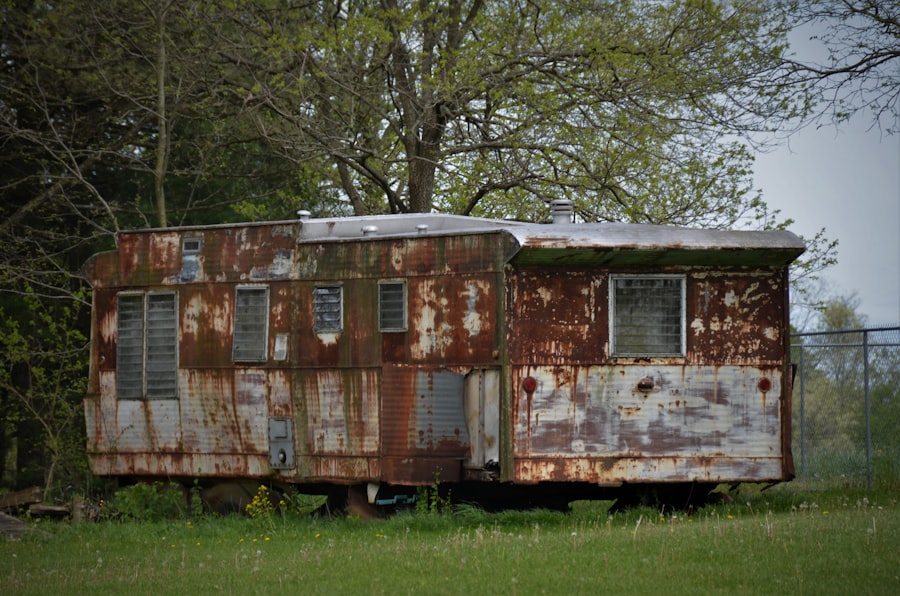Financing a trailer house, often referred to as a mobile home, can be a complex process due to the unique nature of these properties. Unlike traditional homes, trailer houses are often classified as personal property rather than real estate, which can significantly impact financing options. This distinction means that potential buyers may not have access to conventional mortgage loans, which typically require the property to be affixed to a permanent foundation.
Instead, buyers often turn to specialized financing solutions tailored for mobile homes. One of the primary financing options available for trailer houses is personal loans. These loans are unsecured and can be used for various purposes, including purchasing a mobile home.
However, because they are unsecured, personal loans often come with higher interest rates compared to secured loans. Another common option is chattel loans, which are specifically designed for mobile homes that are not permanently affixed to land. Chattel loans allow buyers to finance the purchase of the trailer itself, and they typically have shorter terms and higher interest rates than traditional mortgages.
Understanding these distinctions is crucial for potential buyers as they navigate the financing landscape for trailer houses.
Key Takeaways
- Various financing options exist for trailer houses, including government programs, private lenders, and rent-to-own plans.
- Government assistance programs can offer favorable terms and lower down payments for trailer house buyers.
- Private lenders may provide more flexible financing but often at higher interest rates compared to government options.
- Rent-to-own agreements allow buyers to gradually build equity while living in the trailer house.
- Comparing pros and cons of each financing method helps secure the most affordable and suitable trailer house loan.
Government Assistance Programs for Trailer House Financing
Government assistance programs can play a vital role in making trailer house financing more accessible and affordable for many buyers. One of the most notable programs is the Federal Housing Administration (FHA) Title I loan program, which provides financing for the purchase of mobile homes and related expenses. This program is particularly beneficial for those who may not qualify for conventional loans due to lower credit scores or limited financial history.
The FHA Title I loans can cover the cost of the mobile home itself, as well as necessary improvements and installations. In addition to FHA loans, there are also state-specific programs designed to assist low-income families in purchasing mobile homes. These programs often provide down payment assistance or favorable loan terms to help make homeownership more attainable.
For instance, some states offer grants or low-interest loans specifically for first-time homebuyers looking to purchase a mobile home. By leveraging these government assistance programs, buyers can significantly reduce their financial burden and increase their chances of securing a loan.
Private Lenders Offering Trailer House Financing

Private lenders represent another avenue for financing trailer houses, often providing more flexible terms than traditional banks or credit unions. These lenders can include private mortgage companies, credit unions, and even individual investors who specialize in mobile home financing. One of the advantages of working with private lenders is their willingness to consider factors beyond just credit scores when evaluating loan applications.
This can be particularly beneficial for buyers with less-than-perfect credit histories or those who may not meet the stringent requirements of conventional lenders. Moreover, private lenders may offer a variety of loan products tailored specifically for mobile homes. For example, some may provide short-term loans with higher interest rates but more lenient qualification criteria, allowing buyers to secure funding quickly.
Others might offer longer-term financing options that can help spread out payments over several years. However, it is essential for borrowers to conduct thorough research and compare different private lenders to ensure they are getting the best possible terms and rates.
Rent-to-Own Trailer House Financing Options
| Financing Option | Typical Down Payment | Interest Rate Range | Loan Term | Credit Requirements | Monthly Payment Estimate | Additional Notes |
|---|---|---|---|---|---|---|
| Rent-to-Own Agreement | 5% – 15% of home price | Included in rent, varies by contract | 1 – 3 years lease period | Flexible, often no credit check | Rent + option fee (varies) | Option fee may be credited toward purchase |
| Personal Loan | None | 6% – 36% | 1 – 7 years | Good to excellent credit | Varies by loan amount and term | Unsecured, higher interest rates |
| Chattel Loan | 10% – 20% | 7% – 12% | 5 – 20 years | Fair to good credit | Varies by loan amount and term | Secured by the trailer house itself |
| Manufacturer or Dealer Financing | 5% – 10% | 5% – 15% | 3 – 15 years | Varies, often flexible | Varies by contract | May include incentives or promotions |
| Home Equity Loan (if applicable) | None | 4% – 8% | 5 – 30 years | Good credit, existing home equity | Varies by loan amount and term | Requires existing property ownership |
Rent-to-own agreements present an alternative financing option for those interested in purchasing a trailer house but who may not have sufficient funds for a down payment or who want to test living in the home before committing to a purchase. In a rent-to-own arrangement, the buyer rents the mobile home for a specified period with the option to purchase it at the end of the lease term. A portion of the monthly rent payments is typically credited toward the eventual purchase price, making this an attractive option for many prospective homeowners.
This financing method can be particularly advantageous in markets where housing prices are rising rapidly. By locking in a purchase price at the beginning of the rental agreement, buyers can potentially save money if property values increase during the rental period. Additionally, rent-to-own agreements often require less stringent credit checks than traditional financing options, making them accessible to a broader range of buyers.
However, it is crucial for potential buyers to carefully review the terms of any rent-to-own contract to ensure they understand their rights and obligations throughout the process.
Financing Options for Used Trailer Houses
Purchasing a used trailer house can be an economical choice for many buyers, but it also comes with its own set of financing challenges. Traditional mortgage lenders may be hesitant to finance used mobile homes due to concerns about depreciation and resale value. However, there are still several viable financing options available for those looking to buy a pre-owned mobile home.
One common approach is obtaining a personal loan or a chattel loan specifically designed for used mobile homes. Chattel loans can be particularly useful when financing used trailer houses because they are secured by the home itself rather than by land. This type of loan typically has shorter repayment terms and higher interest rates compared to traditional mortgages but can be an effective way to secure funding quickly.
Additionally, some lenders may offer specialized programs for used mobile homes that take into account their age and condition, allowing buyers to access financing even if the home is older than typical lending guidelines would allow.
Tips for Securing Affordable Trailer House Financing

Securing affordable financing for a trailer house requires careful planning and consideration of various factors that can influence loan terms and interest rates. One of the most critical steps is to improve your credit score before applying for a loan. Lenders typically view higher credit scores as an indicator of lower risk, which can lead to better interest rates and loan terms.
Paying down existing debts, making timely payments on bills, and avoiding new credit inquiries in the months leading up to your application can all contribute to a stronger credit profile. Another essential tip is to shop around and compare offers from multiple lenders. Different financial institutions may have varying criteria and interest rates for trailer house financing, so obtaining quotes from several sources can help you identify the most favorable terms available.
Additionally, consider working with a mortgage broker who specializes in mobile home financing; they can provide valuable insights into which lenders are more likely to approve your application based on your financial situation.
Comparing Different Trailer House Financing Options
When evaluating different trailer house financing options, it is crucial to consider several key factors that can impact your overall financial situation. Interest rates are one of the most significant aspects; even a small difference in rates can lead to substantial savings over the life of a loan. Additionally, pay attention to loan terms—shorter terms may come with higher monthly payments but lower overall interest costs, while longer terms may offer lower monthly payments but result in paying more interest over time.
Another important consideration is whether the loan is secured or unsecured. Secured loans typically have lower interest rates because they are backed by collateral (in this case, the trailer house), while unsecured loans may carry higher rates due to increased risk for lenders. Furthermore, evaluate any fees associated with each financing option, such as origination fees or prepayment penalties, as these can add significant costs over time.
By carefully comparing these factors across different financing options, you can make an informed decision that aligns with your financial goals.
The Pros and Cons of Different Trailer House Financing Options
Each trailer house financing option comes with its own set of advantages and disadvantages that potential buyers should carefully weigh before making a decision. For instance, personal loans offer flexibility and quick access to funds but often come with higher interest rates and shorter repayment terms. Chattel loans provide a viable solution specifically designed for mobile homes but may also carry higher costs due to their unique nature.
Government assistance programs can significantly reduce financial barriers for many buyers; however, they often come with specific eligibility requirements that may not be met by all applicants. Private lenders may offer more lenient qualification criteria but could impose higher fees or interest rates compared to traditional banks. Rent-to-own agreements provide an opportunity for buyers to test out a home before committing but may involve complex contracts that require careful scrutiny.
By understanding these pros and cons, buyers can better navigate their options and choose the financing solution that best fits their needs and circumstances.



